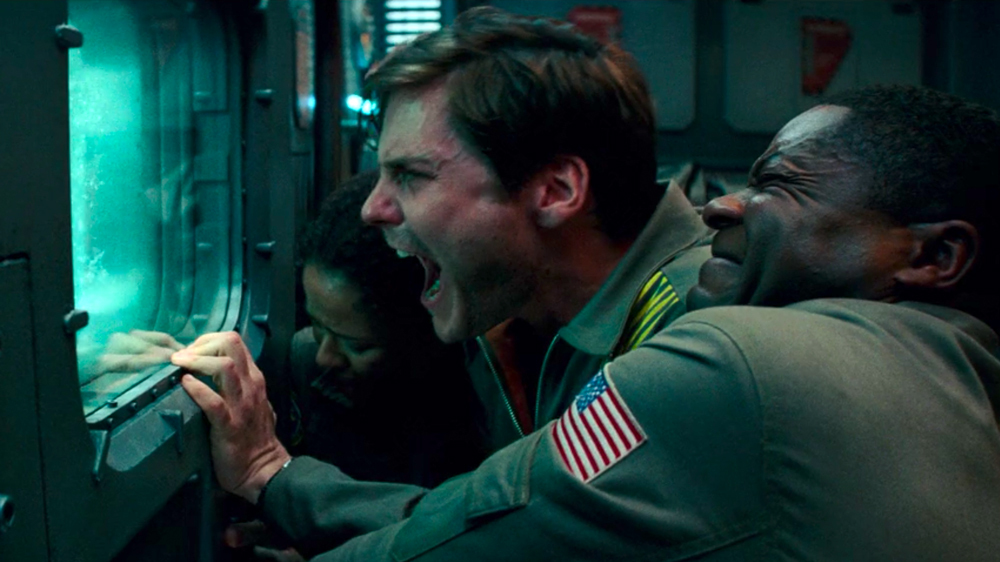If you have, or want to have, children, and you think that there is something wrong with any grown person who isn’t interested in doing the same, then Juliet, Naked is the movie for you. Of course, that’s not a ground breaking or particularly challenging stance for a movie to take. There is an overabundance of movies (and books, and magazine articles, etc., etc.) that reinforces the idea that becoming a parent is the pinnacle of maturity.
Movies about the subject – an overwhelming majority of which are romantic comedies – have thoroughly exhausted one particular “becoming a parent” subgenre. It’s what I’ll call “The Man-child Matures” subgenre. Knocked Up, Nine Months, and About a Boy all focus on emotionally stunted men who grow into responsible adults only when they realize that, yes, becoming a parent is what they really wanted all along. Having parenthood thrust upon them makes them finally grow up.
Read more…
At about 30 minutes into The Cloverfield Paradox, I had one of those moments that often comes along when I’m watching an entertaining bit of genre filmmaking. I took a moment to appreciate how much I was enjoying the experience by mentally telling myself, “I am really into this.” Then, as is often the case with most storytelling, the plot of the movie had to kick in, and things started to go a little haywire. By the end, it was clear just how much of a disaster this movie was. Its plot is nonsensical to the point of being moronic. At least some of Paradox’s coherence problem was made worse because the producers – most notably J.J. Abrams – decided to tie this stand-alone sci-fi movie into the Cloverfield series during filming. This led to the film’s writer, Oren Uziel, penning new scenes and rewriting others, and the director, Julius Onah, shooting those changes in order to make Paradox – originally titled God Particle – fit into the Cloverfield universe. The result is an utter mess of a movie.
Read more...
The best movies about poker are often about more than the game itself. A great example is Rounders. That movie isn’t so much about turning a losing hand into a winner through the power of bluffing as it is loyalty and the limits of friendship. So, too, is screenwriter Aaron Sorkin’s work rarely just about what can be covered in a plot synopsis. The 30-year veteran of stage, TV, and film writing crafted two of the best biopics of this decade with 2010’s The Social Network and 2015’s Steve Jobs. Those films are character studies that seek answers to questions concerning true genius and the uglier traits of driven and brilliant men.
Critics and audiences have often lamented Sorkin’s less deft skill at writing female characters. The women he writes are sometimes two dimensional; they serve to add overwrought hysterics or a love interest to the story. With Molly’s Game, Sorkin has challenged himself to confront this weakness. His protagonist, Molly Bloom, is as driven as the subjects in The Social Network or Steve Jobs. Her story is also as complex, fascinating, and as rewarding of a character study as anything Sorkin has ever written.
Read more...
What’s more important to know about Vincent van Gogh – the man art historians consider the father of modern painting – how he lived, or the circumstances of his death? That’s the question the visually stunning new film Loving Vincent tries to answer. If that’s all you’re thinking about after seeing the film, though, you’ve missed the point. That’s why it’s forgivable that the movie’s story is the weakest thing about it. The way the story is told, though, is unforgettable. Every frame of Loving Vincent was oil-painted by hand. It took a team of 125 painters two years to complete. The movie is a beautiful exception to the rule “form follows function.”
Read more...
Miss Peregrine’s Home for Peculiar Children is filled with oddball characters possessing strange and wonderful powers. Among them is Claire, the little girl with an extra mouth full of razor sharp teeth hidden under the golden locks of her hair. Hugh is a boy with a hive of bees living in his stomach. Emma is lighter than air; if she takes off her lead shoes, she risks floating away.
It would seem like Tim Burton, the decidedly peculiar director known for bringing similarly oddball characters like Edward Scissorhands and Betelgeuse to life, would be the perfect fit for this story. That’s not the case, though. The characters in Miss Peregrine’s Home for Peculiar Children never take on the rich inner life that Burton was able to explore in a character like Edward Scissorhands, or even the normal ones like Lydia Deetz and the Maitlands. Instead, the most peculiar thing about Claire, Hugh, Emma, and the rest are their individual powers. Burton is never able to get below the surface of their strange gifts in order to create fully formed people.
Read more...





